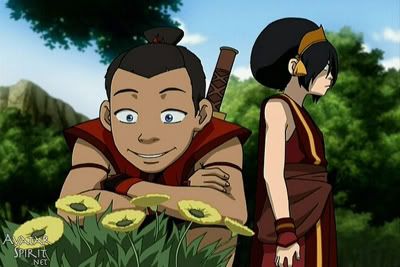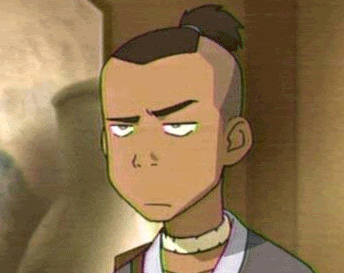(I give the same look to people who actually liked Twilight.)
BUT
The rest of the reason that this bothers me is because it makes no logical sense. Like at all.
If you feel like something about it was badly done, then by all means, crucify it to your heart's content. Badly made movies make me sad. But if "they changed stuff" is the only reason that you didn't like it, then I feel sorry for you, because you probably find very little enjoyment in life.
Here's Why:
(Why is Shyamalan still allowed to make movies?)
 It is perfectly acceptable to be sad about this stuff.
It is perfectly acceptable to be sad about this stuff.But here's the thing. Writing stories and making movie stories are two totally separate genres. The basics of storytelling in both are essentially the same (which is why books can be made into movies at all), but the specifics are very different.
Let's take the Hunger Games as a prime example. Enormous sections of that book are of Katniss running around in the woods. It's interesting reading because we are in her mind, seeing what she thinks, following along as she plots stuff, and feeling what she feels.
But if the movie had stuck to the book with 100% accuracy, this would be the entire movie:
Do you see what I mean? The movie makers HAD to change things. They had to take what was essential narration in the book and turn it into dialogue or images or somehow transfer that knowledge to us without using wildlife-documentary-voiceover.
Movies can not be the same as books. They don't work. It's like taking the score to an opera and trying to translate it into a painting. The ups and downs and fasts and slows that work in a moving piece of music can not come across by copying them with brushstrokes.
Its the same for a movie. The length has to change. The dialogue has to change. The type of show vs. tell has to change. Inner monologue is no longer a function of narration, but of the look on an actor's face, or a twitch in the actor's hand. Scene setting is no longer a function of nicely combined words, but of an actual picture spliced together by talented design artists.
Pacing, characterization, and action sequences all have to change in order to actually work in an audiovisual format.
But sometimes, for the greater good, things have to change.
Sometimes those changes fail. And we all weep.
And sometimes, though not always, those changes actually make things better. Just because something is the original doesn't make it the best choice. If that were true, every published book would be a first draft. No editing. No proofreading. Nothing.
And libraries would be the most useless places on earth.
Taking that a little further still, lots of these choices are entirely subjective. Just because you hated that choice doesn't mean it was a bad decision.
 I admit, I was glad when they left Tom Bombadil out of the LOTR. Some people love him and were really angry that he got cut. But I fail to see the point of him in any way whatsoever. Random dude in yellow boots who prances around in the creepy forest. Right.
I admit, I was glad when they left Tom Bombadil out of the LOTR. Some people love him and were really angry that he got cut. But I fail to see the point of him in any way whatsoever. Random dude in yellow boots who prances around in the creepy forest. Right.These same people also very often refuse to admit that LOTR is a tour-guide type fantasy. It's not plot-driven and it's not meant to be. This isn't bad, by any means. I mean, Tolkien did it on purpose. But it does mean that Tom isn't there because Tolkien had some kind of important role for him to play. He's just there because it was the only way the hobbits could get safely through both the old forest and the barrow downs. Neither of which actually matter, in the grand scheme. But they're on the tour. They exist in his world, and therefore must be seen in great detail.
Only Tolkien could have even gotten away with something like that. If I wrote a Tom Bombadil into one of my stories, I'd get form rejected faster than Bilbo can lunge for the ring on Frodo's throat.
Movies can't do that either. Not only does it not advance the plot, but there is just not time in a movie. If you want a tour movie, go to the non-fiction. As far as actual plot goes, the story is straight up better off just getting to the freaking point.
Anyway, I'm starting to ramble. But what I am saying is this: If the acting is good, and the camera work is good, and the music is good, and the effects are good, and the script is good, and the pacing is good, and the costumes are good, and the editing is good, that means it is a good movie. You don't have to like it. But your disapproval does not change it from a good movie to a bad one. And if it is a good movie...
what are people getting upset about?
But Harry Potter is supposed to have green eyes, and Daniel Radcliff has blue!!!!!! The apocalypse is upon us!!!
Yes, I digress into sarcasm here. But the point remains valid. Has the world ended? Has the non-inclusion of green contacts actually ruined the story?
Uh, no. No it didn't.
As long as the stuff they change was changed well or at least non-intrusively, then no problem exists.
You're allowed to still not like them. That's fine. Not everyone likes every movie. But don't be getting all "BUT THEY CHANGED STUFF!" on me. I will punch you in the face. It can be a good movie AND have changed stuff in it at the same time.
MIND FLIP!!
 I reiterate: If you feel like something about it was badly done, that's fine. But if "they changed stuff" is the only reason that you didn't like it, then I feel sorry for you, because you probably find very little enjoyment in life.
I reiterate: If you feel like something about it was badly done, that's fine. But if "they changed stuff" is the only reason that you didn't like it, then I feel sorry for you, because you probably find very little enjoyment in life.
